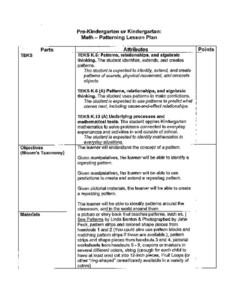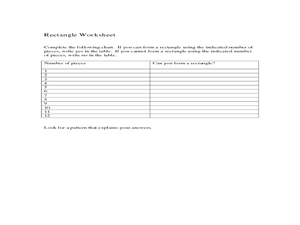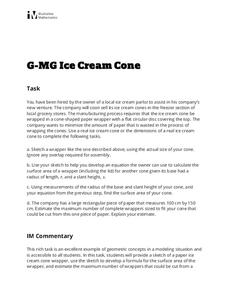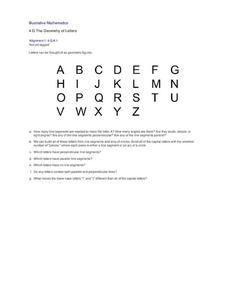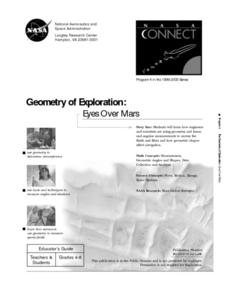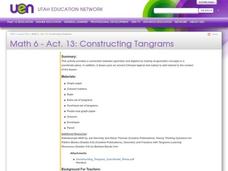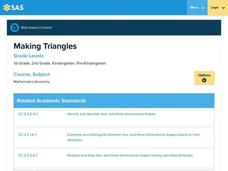Curated OER
Patterning Lesson Plan
Open the eyes of young mathematicians to the patterns that are found everywhere in the world around them. After a shared reading of I See Patterns by Linda Benton, children complete a series of hands-on activities that teach them how to...
Curated OER
Area, Perimeter and Rations Using Pentominoes
Learners of all ages investigate area and perimeter through pentominoes. In this geometry lesson, young scholars calculate the are and perimeter of different geometric shapes and describe the properties of similar and congruent shapes....
Mathematics Vision Project
Module 7: Connecting Algebra and Geometry
The coordinate plane links key geometry and algebra concepts in this approachable but rigorous unit. The class starts by developing the distance formula from the Pythagorean Theorem, then moves to applications of slope. Activities...
Illustrative Mathematics
Ice Cream Cone
Every pupil with a sweet tooth will be clamoring for this lab and analysis, particularly when they're allowed to eat the results! Volume and surface area formulas for cones are developed from models, and then extended to the printing of...
Curated OER
Matchstick Math: Using Manipulatives to Model Linear, Quadratic, and Exponential Functions
Playing with matches (unlit, of course) becomes an engaging learning experience in this fun instructional unit. Teach pupils how to apply properties of exponential functions to solve problems. They differentiate between quadratic and...
Annenberg Foundation
Geometry 3D Shapes: Euler's Theorem
How do you get a theorem named after you? Euler knows what it takes! The third lesson of five asks pupils to use an interactive activity to compare the faces, vertices, and edges of seven different three-dimensional solids. They use...
Curated OER
Put Your Truss in Building Bridges
Students apply abstract concepts, such as stress, fulcrums, the law of gravity, and the strength of different geometric shapes. Groups of student contractors operate simulated architectural firms to create strong, economical bridges.
Noyce Foundation
Tri-Triangles
Develop an understanding of algebraic sequences through an exploration of patterns. Five leveled problems target grade levels from elementary through high school. Each problem asks young mathematicians to recognize a geometric pattern....
Illustrative Mathematics
How Thick Is a Soda Can I?
The humble soda can gets the geometric treatment in an activity that links math and science calculations. After a few basic assumptions are made and discussed, surface area calculations combine with density information to develop an...
Illustrative Mathematics
The Geometry of Letters
Use the alphabet as a tool for teaching your class about geometric figures. Break apart capital letters into line segments and arcs. Classify angles as right, acute, or obtuse. Identify parallel and perpendicular lines. An excellent...
Curated OER
Tiling Tessellations
Young scholars explore tessellations. In this shapes and geometry lesson, students describe the attributes of many of the shapes displayed on an Elmo. Young scholars create examples of tessellations using pattern blocks.
Curated OER
Gotcha Covered, Pardner!
Young geometers use the interactive website Cyberchase to practice calculating both area and perimeter. Real world problems encourage learners to discover that we use math each and every day.
Curated OER
Series Review Sheet
Save an infinite amount of time and enjoy this pre-made series formula guide. Arithmetic and geometric formulas are all included as well as Pascal's Triangle and examples of how the Binomial Theorem expands.
Curated OER
It's Not All Greek to Me
Learners find out the meaning for prefixes used in math vocabulary. By dissecting words used in everyday math, they figure out what the prefix indicates and what the word means. A variety of well-organized worksheets and activities...
Curated OER
Geo-Critters (Geometry Critters)
Students read the book The Math Curse by Jon Scieszka and study geometry. In this geometry lesson, students identify geometric shapes and their properties. Students create a geo-critter.
Curated OER
Geometry: Area Project
Sixth graders identify and use area formulas for finding the area of geometric shapes.
Curated OER
Geometry of Exploration: Eyes Over Mars
Students research how engineers and scientists generate linear and angular measurements with geometry to survey the Earth and Mars. They assess how geometric shapes affect navigation. A surveyor comes to the classroom and explains how he...
Curated OER
A Holocaust Monument
Students create a Holocaust memorial. In this interdisciplinary lesson plan, students use geometric shapes or forms to create a Holocaust monument.
Curated OER
Constructing Tangrams
Seventh graders visualize and identify geometric shapes after applying transformations on a coordinate plane. In this tangrams lesson, 7th graders construct a set of tangrams and then answer extension questions related to measurement,...
Curated OER
Geometry and Quilting
Fourth graders combine geometry and language arts skills while examining quilt-making. After identifying the geometric shapes contained in quilts, they write stories to encompass the quilt border. Students conclude by creating and...
Curated OER
Identifying Patterns
Students investigate the elements of a pattern. In this geometry instructional activity, students identify different shapes in a pattern and discover which shapes are missing in order to extend it. Students create their own patterns...
Curated OER
Exemplary Plans, Engineer It!
Students research tall buildings and identify the geometric shapes used in the construction of the buildings. They compare shapes and infer why some are better than others in building. They produce a multimedia presentation of geometric...
Pennsylvania Department of Education
Making Triangles
Pupils use interactive geoboards to identify simple geometric shapes. In this making triangles lesson plan, students describe the properties associated with geometric shapes. Pupils develop spatial sense and the mathematical meaning of a...
Curated OER
Folded Fractions
Second graders, in pairs, use various geometric shapes to represent fractional parts and divide them into equal parts.


